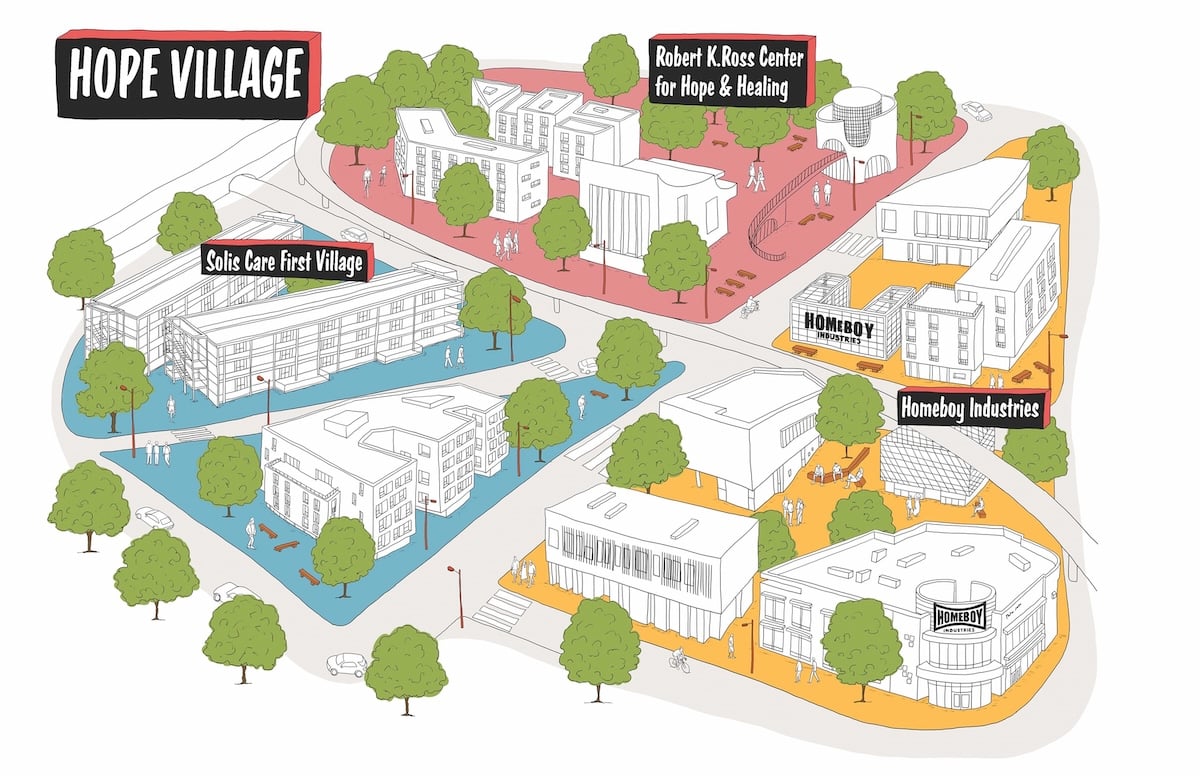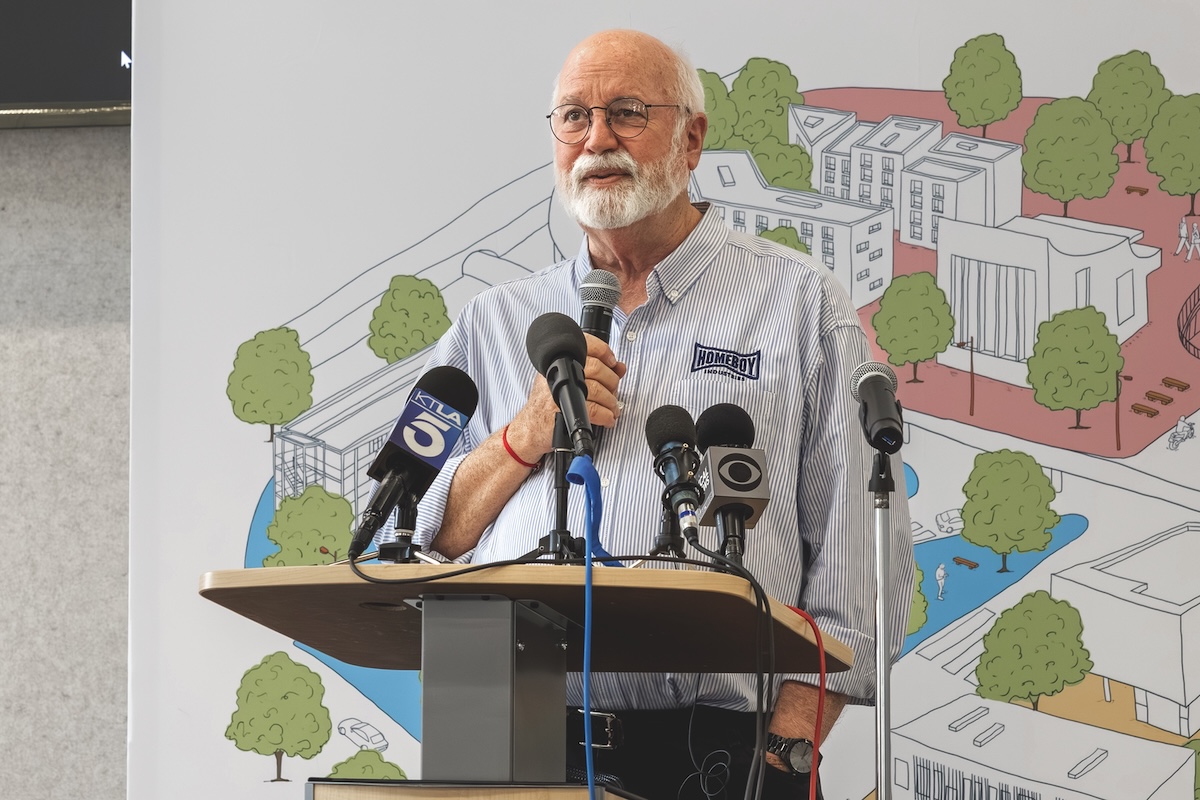Homeboy Industries launched a $100 million fundraising campaign seeded and co-chaired by billionaire Frank McCourt of McCourt Partners for the development of the Fr. Gregory Boyle Center for Radical Kinship.
The new center, which will include 200 units of supportive and transitional housing and 35,000 square feet for health and career services, will serve as a key component of Hope Village – a largescale
urban campus designed to reshape the process of re-entry for formerly incarcerated individuals, McCourt and Homeboy Industries founder Father Gregory Boyle announced.
McCourt, who is also former owner of the Los Angeles Dodgers, pledged the first $10 million to launch the campaign.
“Hope Village and Homeboy embody the values of kinship, resilience and community,” said McCourt. “Now more than ever, we need to empower organizations that are investing in human potential, unlocking opportunities and providing hope, as well as the necessary support systems to those who need it most.”
Boyle founded Homeboy Industries in 1988 to push back against gang violence through a humanitarian approach. The nonprofit provides wraparound services and workforce development opportunities for at-risk youth and those formerly incarcerated or tied to gangs. About 10,000 former gang members and those formerly incarcerated seek help from Homeboy each year.
Homeboy Industries has launched 14 “social enterprises” for people to acquire new skills. Homeboy Bakery and Homegirl Café in Chinatown are among the organization’s most notable businesses, where trainees are employed. In April, the organization hosted the grand opening of its Homeboy Puppy Fades dog grooming salon in Pasadena; and last year, they opened an electronics recycling plant.
“This isn’t just about expanding us. It’s about inviting us to imagine (who we are as an organization),” Boyle said during the press conference. The new center is about “prioritizing healing the wound instead of punishing it … In this collaborative mission and commitment to Hope Village, we focus on long-term health and wellness of individuals and their families to make Los Angeles and our communities safer.”
 Plans: Hope Village project. (Rendering c/o Homeboy Industries)
Plans: Hope Village project. (Rendering c/o Homeboy Industries)
Located near Men’s Central Jail in Chinatown, Hope Village will take the place of outdated infrastructure and empty lots. Funds from this campaign will support the necessary land acquisition as well as overall development.
KFA Architecture, which is designing the Boyle Center, noted that the development will feature separate floors for men, women and families and include a gym and outdoor community space.
Based on the development plans for the entire center, transitional and permanent supportive housing would be the first two phases of the project. The third phase is the center, which will partly be dedicated to mental health and wellness services.
The village will also have Hilda Solis Care First Village and The California Endowment’s Robert K. Ross Center for Hope and Healing – both with similar facilities as the Boyle Center.
The Hilda Village was first completed in 2021 and focuses specifically on serving homeless Angelenos, providing housing, meals and health and case management services to over 200 people at a time.
Meanwhile, the Ross Center has yet to break ground, but plans call for 124 apartments and more than 66,000 square feet of space for nonprofit providers.
Designed by Long Beach architecture firm Studio One Eleven, the Ross Center will reflect trauma-informed design principles catered to justice-impacted households and re-entry individuals.
McCourt said during a press conference that he was “immediately taken by the project” especially at a time when he feels “empathy (and) compassion” are lacking in the world.
“The idea of building something not too far from the county jail, which is kind of a grim place, … that’s beautiful and hopeful … (is) a metaphor really for where we are right now,” he said. “We can accept grim and dark or we can imagine hope and beauty and grace and light and love.”
 Investor: Frank McCourt. (Photo c/o Homeboy Industries)
Investor: Frank McCourt. (Photo c/o Homeboy Industries)
In addition to the funding, McCourt has employed the expertise of the McCourt School of Public Policy at Georgetown University to guide research and create opportunities for students to get involved with Homeboy’s work.
“We look forward to collaborating with the Homeboy Network in a variety of ways, including hosting an annual convening aimed at sharing best practices on a national scale and providing opportunities for our students to engage in this important work,” said Carole Roan Gresenz, dean of Georgetown University’s McCourt School of Public Policy.
Between all the developments that will make up Hope Village, Homeboy co-Chief Executives Shirley Torres and Steve Delgado said they expect it will provide housing and services to thousands of people every year. Dubbing the Boyle Center and Hope Village as “a new paradigm in care first for those in need,” Torres and Delgado said the overall mission is “reducing the heavy burden on systems like Men’s Central Jail” in a joint statement.
Homeboy Industries will also relocate its art academy into a new 5,000-square-foot “contemporary space” within Hope Village “where hundreds will engage in innovative programming focused on healing, training and creative expression across multiple art forms,” according to a release.
Los Angeles City Councilmember Eunisses Hernandez, who represents parts of northeast and northwest L.A.
“My hope is that (the new center) and Hope Village becomes a model for the whole country and the world, because every community deserves this kind of space that believes in people enough to invest in them,” Hernandez said at a press conference.

